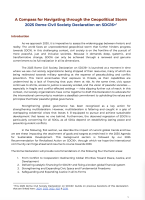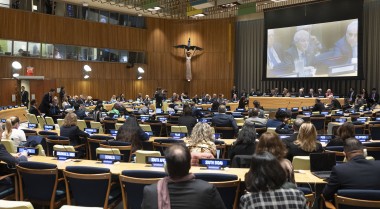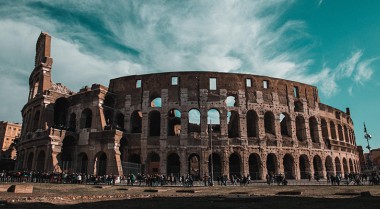
“A Compass for Navigating through the Geopolitical Storm”
Civil Society Calling for Action on SDG16+ : 2025 Rome Civil Society Declaration on SDG16
Launch of the 2025 Rome Civil Society Declaration on SDG16
The latest iteration of the Rome Civil Society Declaration on SDG16+ is launched today on May 12th at the United Nations Headquarters in New York. A joint delegation from the Civil Society Platform for Peacebuilding and Statebuilding (CSPPS) and the TAP Network: Transparency, Accountability and Participation for the 2030 Agenda presented earlier today the Declaration during the SDG16 Conference co-organised by UN DESA, the Permanent Mission of Italy and IDLO.
Building on the foundations of previous editions, this year’s Declaration is particularly significant, as it emerges at a time of deep global turmoil. In the face of an unprecedented number of overlapping crises, and with only five years remaining to achieve the 2030 Agenda for Sustainable Development, CSPPS and the TAP Network joined forces to collect input from civil society organizations from across the globe on how to effectively accelerate action on SDG16+.
SDG16+ at a Crossroads : challenges amid global crises
As the world edges closer to 2030, the gap between global commitments and concrete actions toward peaceful, just, and inclusive societies is widening. Armed conflict is escalating, both in frequency and intensity, driven by new and protracted crises that increasingly transcend borders. In this context, fragile and conflict-affected settings are experiencing the greatest strain, with rising displacement, the spread of small arms, and the breakdown of local governance structures. Civilian populations, particularly women, children, and marginalized communities, bear the brunt of this violence, which continues to rise amid a global surge in military spending.
At the same time, civic space is deteriorating at an alarming rate. Around the world, repressive measures are silencing dissent and curtailing activism. This rollback of fundamental freedoms has become widespread, even in long-standing democracies. As civil society organizations are criminalized and defunded, their ability to deliver essential services, foster accountability, and promote inclusive governance is gravely undermined.
These political and security crises are compounded by the climate emergency, which exacerbates resource scarcity, displacement, and social tensions—particularly in fragile contexts. Yet, the global response remains dangerously inadequate. The international financial system, already failing to deliver on the scale required, continues to privilege short-term security interests over long-term development, with official development assistance in decline and justice systems chronically underfunded. The result is a world increasingly unanchored: one where impunity grows, civic trust erodes, and the foundations of peace, justice, and inclusive societies are dangerously weakened.
Turning commitments into action
In the face of mounting global instability, the 2025 Rome Civil Society Declaration on SDG16+ issues an urgent appeal to governments, multilateral institutions, donors, and all stakeholders: we must decisively reorient global priorities toward peace, justice, and inclusion. The time for incremental responses has passed. Only bold, coordinated, and systemic action can address the root causes of conflict, strengthen institutions, and protect the rights and dignity of all people.
This call begins with a demand to reverse the alarming trend of militarization. Resources must be shifted away from excessive military expenditures and redirected toward peacebuilding and conflict prevention. Community-based, locally led efforts must be recognized and resourced as the backbone of peaceful societies. No peace process can succeed without inclusive participation and accountability grounded in international law.
Equally urgent is the need to reform a broken global financial system. The international community must ensure adequate, predictable, and accessible funding for civil society, especially in fragile contexts. This includes moving beyond rigid, short-term project funding toward long-term, flexible investments that empower local actors. Transparency, accountability, and inclusive civic participation must be central to how development resources are mobilized and spent.
Fundamental freedoms and civic space must be protected and expanded. Civil society is not a peripheral actor—it is a vital force for democratic resilience, service delivery, and social cohesion. Governments must safeguard the rights to freedom of expression, assembly, and association, and resist the normalization of repressive tactics. Legal and political frameworks should guarantee meaningful participation for all, especially for historically excluded groups.
Finally, access to justice must be treated as a foundational priority. Too many people around the world remain locked out of fair, accessible, and effective justice systems. Governments and donors must invest in grassroots justice initiatives, informal and customary mechanisms, and people-centered policy frameworks that embed justice in all its dimensions—social, economic, environmental, and beyond. Upholding and strengthening international justice institutions is essential to ensure accountability and reinforce the rule of law.
This Declaration serves as a roadmap, calling for renewed and sustained commitment. It underscores the critical relevance of SDG16+ in today’s context and must act as a compass—both to navigate current crises and to guide the long-term pursuit of a more peaceful, just, and inclusive world.
To endorse the 2025 Rome Civil Society Declaration on SDG16+, click on this link : https://bit.ly/Endorse2025DeclarationSDG16
[Para leer la versión en español, haga clic aquí.] [Pour lire la version française, cliquez ici.]



